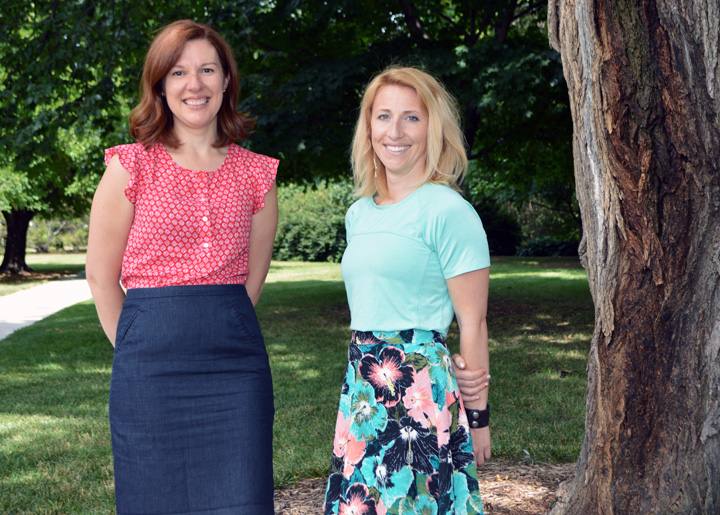
Dr. Martha Shulski and Hannah Birge, of the School of Natural Resources, will represent the University of Nebraska-Lincoln at UArtic Congress 2016 this fall in St. Petersburg, Russia.
UArctic is a cooperation of universities, colleges, research institutes and organizations dedicated to research and education in the far North. By pooling knowledge, infrastructure and resources, UArctic is better able to address the complex social-ecological needs of the region than any individual entity on its own, Birge explained.
UNL will became the first Big 10 school and one of the first public institutions in the United States to become a member of the cooperative network that spans all 24 time zones and includes 170 members. It will be inducted into the cooperative during the Congress set for Sept. 12 to 16.
Shulski will be the representative to the main Congress; Birge will represent the university at the Student Forum. Shulski is the director of the Nebraska State Climate Office and SNR’s resident Arctic expert; Birge is an applied ecology doctoral student in SNR. Dr. Sheri Fritz, of Earth and Atmospheric Sciences, also serves as a UNL UArctic representative, but she is not available to attend the conference this year.
“It will be a great privilege for me to formally present UNL and our capacity to the UArctic membership,” Shulski said. “I think UNL will benefit from being a part of this group in terms of physical and social science research issues, policy applications and indigenous community adaptation.”
“What happens in the Arctic doesn’t stay in the Arctic,” she added. “Changes that are occurring in the polar regions have been shown to influence conditions here in Nebraska and across the mid-latitudes. When you think of large-scale changes in a seemingly far-off place, don’t picture a polar bear standing on an ice floe, think of prairie chicken roaming the Plains.”
Birge echoed those statements.
“I think many of us are becoming increasingly aware of our planets tight connectedness, and the Arctic is clear example,” said Birge, who is studying grassland ecology, soil science, complexity and adaptive governance. She said that changes occurring in the Polar Region “have been linked to extreme weather events at mid-latitudes locations – including Nebraska, where our local economy relies on a predictable range of temperate climate.”
“The magnitude and complexity of this relationship is not lost on experts,” Birge said. “There is a strong effort to better understand the complex Arctic- and mid-latitude climate change connection.”
Shulski plays a key role in that effort. For seven years, she worked as a climatologist for the state of Alaska at the Geophysical Institute in the University of Alaska Fairbanks. She was lead author on the book “The Climate of Alaska,” which included her research focused on climate and its impacts on people and landscape.
“I was able to be invited by the U.S. State Department to attend a Conference on Global Leadership in the Arctic in Anchorage, Alaska, last August when Secretary of State John Kerry, President Barack Obama and Arctic nation leaders discussed Arctic issues and how to move forward as a global community to address them.”
That meeting was one of the inspirations for the Changing Arctic workshop last fall co-organized by Shulski and former SNR director and NDMC founder Don Wilhite, with federal support from NOAA’s National Integrated Drought Information System and the USDA’s Office of the Chief Economist. The workshop to talk about Arctic issues and how it’s impacting the central United States (Materials from the workshop can be found at http://go.unl.edu/arcticclimateworkshop.)
All of these point to the importance of participating in the UArctic Congress 2016.
“I can’t emphasize enough how important it is that climate change – happening first and most quickly in the Arctic – is a global issue that requires all hands on deck,” Birge said. “We can’t stand by and let the arctic be a lesson in what not to do for the rest of the world, because there is an ethical and logical imperative to mitigate and adapt in the Arctic now – and fast.”
“This will be an amazing opportunity to absorb knowledge and help synthesize solutions through international collaboration,” she added.
Shulski couldn’t agree more. Both hope to glean new skills from their experiences in Russia and apply them to their roles at SNR.
For more information on UArctic, visit http://www.uarctic.org. For more information on UArctic Congress 2017, which will be in Greenland, visit http://www.uarctic.org/calendar/uarctic-council-meeting-2017/
Shulski will be posting to social media while at the Congress. Follow her on Twitter at @mshulski3. Birge will write about her experience following the event; read that account in September on the SNR website.
-- Shawna Richter-Ryerson, Natural Resources
More details at: snr.unl.edu